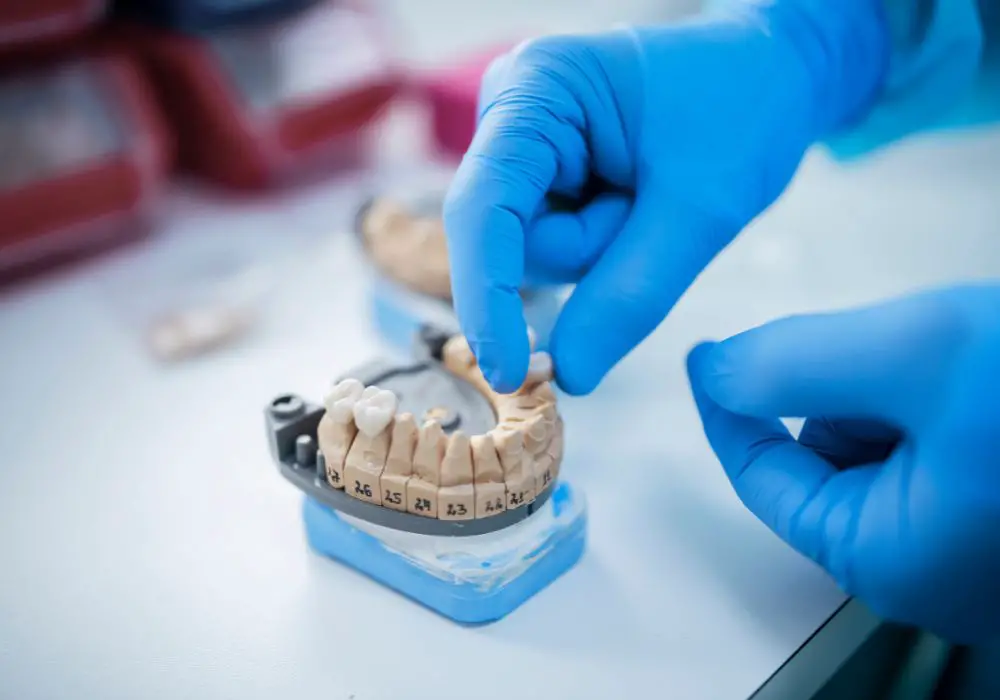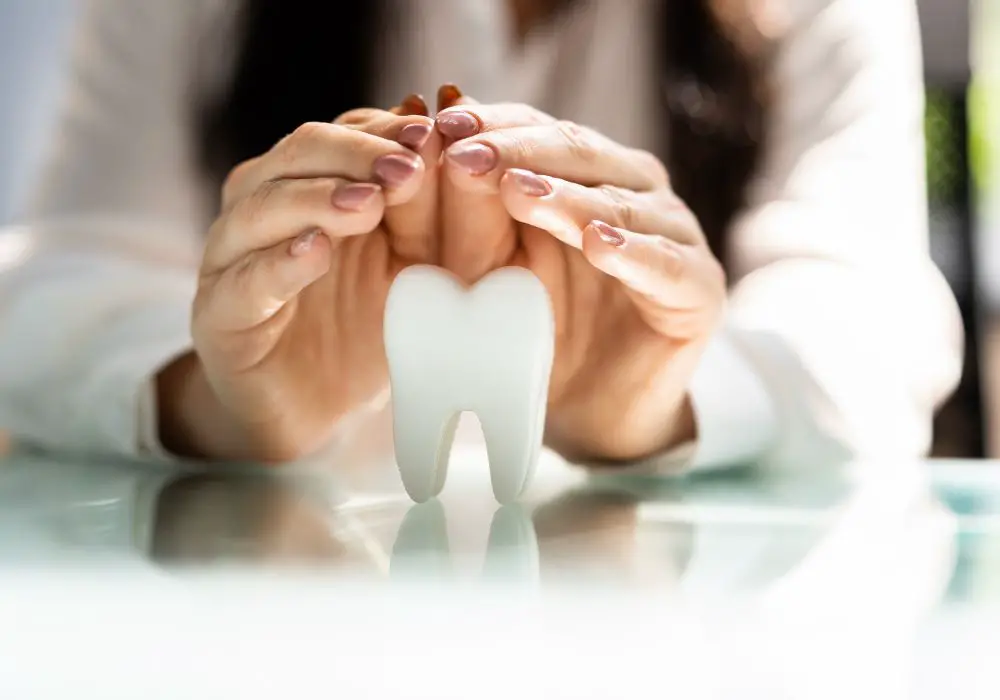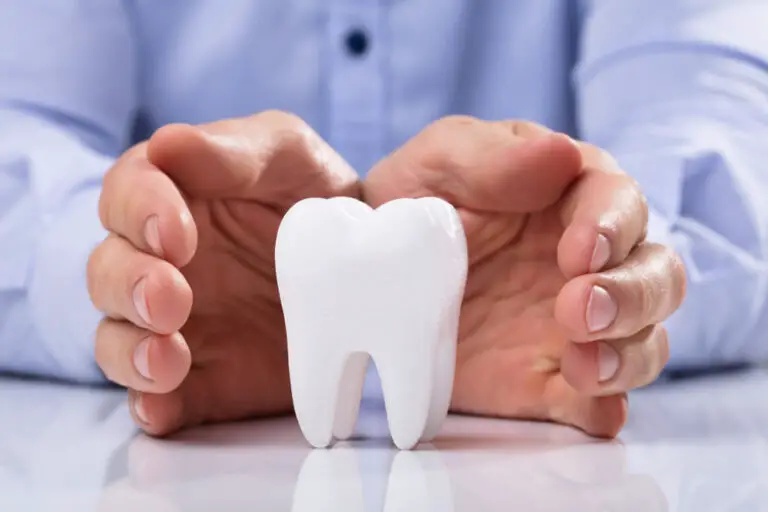Have you ever wondered what it’s called when you replace all of your teeth? Maybe you’re considering this option for yourself or a loved one, or you’re simply curious about the process. Whatever the reason, you’ve come to the right place for answers.
Replacing all of your teeth is a major decision that requires careful consideration and planning. There are several options available, including dental implants, full mouth dentures, and partial dentures. Each option has its own benefits and drawbacks, and the best choice for you will depend on your individual needs and preferences. In this article, we’ll explore each option in more detail, so you can make an informed decision about what’s right for you.
Understanding Tooth Replacement

What is Tooth Replacement?
Tooth replacement is a dental procedure that involves the replacement of missing or damaged teeth with artificial teeth that look and function like real ones. Dental implants are the most common and effective method of tooth replacement. They are metal, screw-like posts that are surgically placed into the jawbone to replace the roots of missing teeth. Once the implants are in place, artificial teeth are attached to them, providing a permanent solution to tooth loss.
Why Replace All Teeth?
There are several reasons why you might consider replacing all of your teeth. One of the most common reasons is severe tooth decay or gum disease that has resulted in the loss of multiple teeth. In this case, replacing all of your teeth with dental implants can improve your oral health and overall quality of life.
Another reason you might consider replacing all of your teeth is if you have dentures that are uncomfortable or don’t fit properly. Dentures can slip or move around in your mouth, making it difficult to eat and speak. Replacing all of your teeth with dental implants can provide a more stable and comfortable solution.
Replacing all of your teeth with dental implants can also help prevent bone loss in your jaw. When you lose teeth, the bone in your jaw begins to deteriorate, which can cause your remaining teeth to shift and your face to appear sunken. Dental implants stimulate bone growth in your jaw, helping to maintain its shape and density.
In summary, tooth replacement is a dental procedure that involves the replacement of missing or damaged teeth with artificial teeth that look and function like real ones. Dental implants are the most common and effective method of tooth replacement, and replacing all of your teeth with dental implants can improve your oral health, overall quality of life, and prevent bone loss in your jaw.
Methods of Tooth Replacement

If you have lost all of your teeth, there are several methods of tooth replacement available to you. The most common methods are dentures, dental implants, and All-On-4 dental implants.
Dentures
Dentures are removable appliances that are used to replace missing teeth. They come in two types: full dentures and partial dentures. Full dentures are used when all of the teeth are missing, while partial dentures are used when only some of the teeth are missing.
Dentures are made from a combination of materials, including acrylic resin, porcelain, and metal. They are custom-made to fit your mouth and are held in place by suction or clips. Dentures can take some time to get used to, but they are a good option for people who cannot have dental implants.
Dental Implants
Dental implants are a popular method of tooth replacement. They are artificial tooth roots that are placed into the jawbone to support a replacement tooth or bridge. Dental implants are made from titanium, which is biocompatible and can fuse with the bone.
The process of getting dental implants involves several steps, including a consultation, implant placement, and crown placement. Dental implants can take several months to complete, but they are a long-lasting and natural-looking option for tooth replacement.
All-On-4 Dental Implants
All-On-4 dental implants are a type of dental implant that is used to replace all of the teeth in the upper or lower jaw. They are called All-On-4 because they use four dental implants to support a full arch of replacement teeth.
All-On-4 dental implants are a good option for people who have lost all of their teeth and want a permanent, natural-looking solution. The process of getting All-On-4 dental implants is similar to getting regular dental implants, but it can be completed in a shorter amount of time.
In summary, dentures, dental implants, and All-On-4 dental implants are all methods of tooth replacement that can be used when all of the teeth are missing. Each method has its own advantages and disadvantages, so it is important to consult with a dentist to determine which method is best for you.
Factors to Consider

When it comes to replacing all of your teeth, there are several factors that you should consider before making a decision. Below are some important factors to keep in mind:
Cost
Replacing all of your teeth can be a significant financial investment. The cost can vary depending on the type of procedure you choose, the materials used, and the location of the dental practice. It’s important to do your research and get estimates from several different dental professionals before making a decision. Additionally, some dental insurance plans may cover a portion of the cost, so be sure to check with your provider.
Procedure Duration
The duration of the procedure can vary depending on the type of procedure you choose and the number of teeth being replaced. Some procedures, such as full mouth dental implants, may require multiple appointments over several months. Other procedures, such as dentures, may be completed in a shorter amount of time. It’s important to discuss the duration of the procedure with your dental professional and make sure you understand what to expect.
Longevity
The longevity of the replacement teeth is an important factor to consider. Some procedures, such as dental implants, can last for many years with proper care. Other procedures, such as dentures, may need to be replaced more frequently. It’s important to discuss the expected lifespan of the replacement teeth with your dental professional and make sure you understand the maintenance required to keep them in good condition.
Maintenance
Proper maintenance is essential to ensure the longevity of your replacement teeth. This includes regular brushing and flossing, as well as regular visits to your dental professional for cleanings and checkups. Some procedures, such as dental implants, may require additional maintenance, such as periodic adjustments or replacements of the prosthetic teeth. It’s important to discuss the maintenance requirements with your dental professional and make sure you understand what is required to keep your replacement teeth in good condition.
In summary, replacing all of your teeth is a significant decision that requires careful consideration of several factors, including cost, procedure duration, longevity, and maintenance. It’s important to do your research, discuss your options with your dental professional, and make an informed decision that is right for you.
Potential Risks and Complications
When considering a full teeth replacement procedure, it is important to understand the potential risks and complications that may arise. While these risks are generally rare, it is important to be aware of them to make an informed decision about your dental health.
Infection
Like any surgical procedure, there is a risk of infection when replacing all of your teeth. To minimize this risk, your dentist will likely prescribe antibiotics before and after the procedure. It is important to follow your dentist’s instructions regarding antibiotics and proper oral hygiene to reduce the risk of infection.
If an infection does occur, it can be treated with antibiotics. However, in rare cases, the implant may need to be removed to prevent the infection from spreading.
Implant Failure
Another potential risk of full teeth replacement is implant failure. This occurs when the implant does not properly fuse with the jawbone, which can result in the implant becoming loose or falling out.
To reduce the risk of implant failure, it is important to choose a qualified and experienced dentist who uses high-quality implants. It is also important to follow proper oral hygiene practices and avoid smoking, which can hinder the healing process.
If implant failure does occur, the implant may need to be removed and replaced. In some cases, additional procedures such as bone grafting may be necessary to ensure proper implant fusion.
Overall, while there are potential risks and complications associated with full teeth replacement, they are generally rare and can be minimized through proper care and choosing a qualified dentist.
Benefits of Tooth Replacement

If you are considering replacing all of your teeth, there are several benefits to this procedure. Here are some of the benefits you can expect:
Improved Oral Health
Replacing all of your teeth can improve your oral health in many ways. When you have missing teeth, the remaining teeth can shift and become misaligned. This can lead to issues with your bite and can cause problems with your jaw and surrounding muscles. By replacing all of your teeth, you can prevent these issues from occurring and maintain proper alignment.
Aesthetic Appeal
Replacing all of your teeth can also improve your aesthetic appeal. Missing teeth can make you feel self-conscious about your smile and can cause you to hide your teeth when you speak or smile. By replacing all of your teeth, you can restore your smile and feel confident in your appearance.
Enhanced Functionality
Replacing all of your teeth can also enhance your ability to eat and speak properly. Missing teeth can make it difficult to chew certain foods, and can cause you to slur your words or mumble when you speak. By replacing all of your teeth, you can improve your ability to eat and speak properly, which can greatly improve your quality of life.
Overall, replacing all of your teeth can provide many benefits. It can improve your oral health, enhance your aesthetic appeal, and improve your functionality. If you are considering this procedure, be sure to talk to your dentist to determine if it is the right option for you.
Frequently Asked Questions
What are the options for replacing missing teeth?
When it comes to replacing missing teeth, you have two main options: dentures and dental implants. Dentures are a removable appliance that can be used to replace missing teeth, while dental implants are a permanent solution that involves surgically placing a titanium post into the jawbone to support a replacement tooth.
How much does it cost to replace all of your teeth?
The cost of replacing all of your teeth can vary depending on the type of replacement option you choose and the number of teeth that need to be replaced. Generally, dental implants tend to be more expensive than dentures, but they also tend to be more durable and longer-lasting.
Is it safe to have all of your teeth removed at once?
Having all of your teeth removed at once can be a safe and effective option for some people, but it is important to discuss the risks and benefits with your dentist or oral surgeon before making a decision. In some cases, it may be necessary to remove teeth in stages to reduce the risk of complications.
Can you replace all of your teeth with implants?
Yes, it is possible to replace all of your teeth with dental implants. This option is known as full arch dental implants and involves placing multiple implants throughout the jawbone to support a full set of replacement teeth.
What are the benefits of replacing all of your teeth?
Replacing all of your teeth can have a number of benefits, including improved oral health, better speech and chewing ability, and a more confident smile. Additionally, dental implants can help to prevent bone loss in the jaw and maintain the structure of the face.
How many teeth can be replaced at one time?
The number of teeth that can be replaced at one time will depend on a number of factors, including the health of your gums and jawbone, the type of replacement option you choose, and your individual needs and preferences. Your dentist or oral surgeon can help you determine the best course of action for your specific situation.







